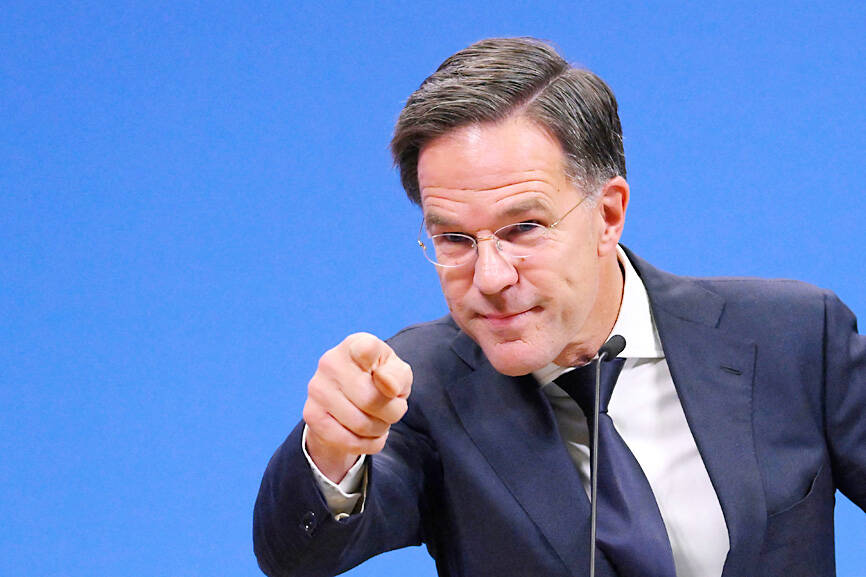NATO Secretary-General Mark Rutte yesterday sidestepped questions about Ukraine’s possible membership of the military alliance, saying that the priority now must be to strengthen the nation’s hand in any future peace talks with Russia by sending it more weapons.
Rutte’s remarks, ahead of a meeting of NATO foreign ministers, came days after Ukrainian President Volodymyr Zelenskiy said that extending alliance membership to territory now under Kyiv’s control could end “the hot stage” of the almost three-year war in Ukraine, where Russian forces are pressing deeper into their western neighbor.
“The front is not moving eastwards. It is slowly moving westwards,” Rutte said. “So we have to make sure that Ukraine gets into a position of strength, and then it should be for the Ukrainian government to decide on the next steps, in terms of opening peace talks and how to conduct them.”

Photo: AFP
At their summit in Washington in July, leaders of the 32 NATO member nations insisted that Ukraine is on an “irreversible” path to membership, but some, led by the US, have balked at moving forward while the war rages and before the nation’s borders are clearly demarcated.
NATO was founded on the principle that an attack on any ally should be considered an attack on them all.
Ukrainian officials yesterday made it clear that they would not countenance any half measures or stopgap solutions on NATO membership.
The Ukrainian Ministry of Foreign Affairs issued a strongly worded statement saying that Ukraine “will not settle for any alternatives, surrogates or substitutes for Ukraine’s full membership in NATO,” citing its “bitter experience of the Budapest Memorandum.”
Under the international agreement signed in the Hungarian capital 30 years ago, Ukraine agreed to give up its Soviet-era nuclear weapons, which amounted to the world’s third-largest nuclear arsenal, in return for security guarantees from Russia, the US and the UK.
The ministry statement called the Budapest agreement a “monument to short-sightedness in making strategic security decisions.”
Reflecting on his meeting with US president-elect Donald Trump, Rutte said he had underlined that China, North Korea and Iran were weighing in on Russia’s side, putting the US and the Asia-Pacific region at risk.
“Whenever we get to a deal on Ukraine it has to be a good deal, because what we can never have is high-fiving [North Korean leader] Kim Jong-un and [Chinese President] Xi Jinping [習近平] and whoever else,” Rutte said, adding that this would only encourage the leaders of North Korea and China to endorse the use of force elsewhere.

CARROT AND STICK: While unrelenting in its military threats, China attracted nearly 40,000 Taiwanese to over 400 business events last year Nearly 40,000 Taiwanese last year joined industry events in China, such as conferences and trade fairs, supported by the Chinese government, a study showed yesterday, as Beijing ramps up a charm offensive toward Taipei alongside military pressure. China has long taken a carrot-and-stick approach to Taiwan, threatening it with the prospect of military action while reaching out to those it believes are amenable to Beijing’s point of view. Taiwanese security officials are wary of what they see as Beijing’s influence campaigns to sway public opinion after Taipei and Beijing gradually resumed travel links halted by the COVID-19 pandemic, but the scale of

TRADE: A mandatory declaration of origin for manufactured goods bound for the US is to take effect on May 7 to block China from exploiting Taiwan’s trade channels All products manufactured in Taiwan and exported to the US must include a signed declaration of origin starting on May 7, the Bureau of Foreign Trade announced yesterday. US President Donald Trump on April 2 imposed a 32 percent tariff on imports from Taiwan, but one week later announced a 90-day pause on its implementation. However, a universal 10 percent tariff was immediately applied to most imports from around the world. On April 12, the Trump administration further exempted computers, smartphones and semiconductors from the new tariffs. In response, President William Lai’s (賴清德) administration has introduced a series of countermeasures to support affected

Pope Francis is be laid to rest on Saturday after lying in state for three days in St Peter’s Basilica, where the faithful are expected to flock to pay their respects to history’s first Latin American pontiff. The cardinals met yesterday in the Vatican’s synod hall to chart the next steps before a conclave begins to choose Francis’ successor, as condolences poured in from around the world. According to current norms, the conclave must begin between May 5 and 10. The cardinals set the funeral for Saturday at 10am in St Peter’s Square, to be celebrated by the dean of the College

CROSS-STRAIT: The vast majority of Taiwanese support maintaining the ‘status quo,’ while concern is rising about Beijing’s influence operations More than eight out of 10 Taiwanese reject Beijing’s “one country, two systems” framework for cross-strait relations, according to a survey released by the Mainland Affairs Council (MAC) on Thursday. The MAC’s latest quarterly survey found that 84.4 percent of respondents opposed Beijing’s “one country, two systems” formula for handling cross-strait relations — a figure consistent with past polling. Over the past three years, opposition to the framework has remained high, ranging from a low of 83.6 percent in April 2023 to a peak of 89.6 percent in April last year. In the most recent poll, 82.5 percent also rejected China’s